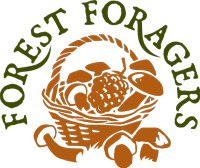Below is an example of our day schedule – we do adjust timings according to conditions.
Programme Description | 1-Day Courses
09:30 Start: Tea and coffee
Welcome and introductions. An online foraging guide will be sent prior to the course.
10:00 Introductory Session: Setting the scene.
The course structure is explained – our aim (by the end of the day) is to ensure that participants are confident about collecting and eating some wild mushrooms and plants. The focus will be on the food experience, not the survivalist approach to wild food.
Plants: Slide presentation covering 18 species, focusing on some of the best edible plants, and a few species to avoid. Information about how to collect, the hazards and necessary precautions to be taken.
Activity: Plants – matching the photos to names and edibility.
11:00 Tea and coffee break
Mushrooms: Slide presentation covering 18 species, including the very best edible mushrooms and some poisonous ones. Also there will be some safety advice regarding mushroom collecting.
Activity: Mushrooms – matching the photos to names and edibility.
12:30 Lunch
This will include wild mushrooms and plants. There will be soup and bread; tart and salad; a casserole and rice main course and wine to complement the meal; and dessert. There will be a vegetarian option if booked in advance. Please let us know of any allergies or special dietary requirements that you may have.
1:30 Activity
Guided collecting walk around a nearby site.
3:30 Return to the training centre: Tea and coffee break
3:45 Concluding Session
The course participants divide into two groups.
Group A. Clifford shows how to check collected material for edibility and condition and how to prepare mushrooms for later use.
Group B. Peter gives a demonstration of how to prepare and cook a simple wild mushroom dish.
(A and B groups will alternate with each other and so will attend both demonstrations).
A course evaluation questionnaire will be given out and there will be an opportunity to give verbal feedback.
